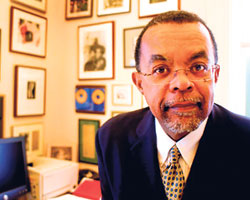NEW YORK - In the afternoon of July 16 two men appeared to be breaking into a fine house in an expensive area of Cambridge, Massachusetts. Alerted by a telephone call, a policeman arrived smartly on the scene. He saw one black male standing inside the house and asked him to come out.
The man refused. He was then told to identify himself. The man, still refusing to step out, said he was a Harvard professor, showed his ID, and warned the cop not to mess with him. He said something about black men in America being singled out, and asked the cop, who was white, for his name and identification. The cop, joined by several colleagues, arrested the professor for disorderly conduct.
We now know that the professor had broken into his own home, with the help of his chauffeur, because the door was jammed.
What was unusual here was not the cop's heavy-handedness. Most people in the US know that if you talk back to the police, they will get nasty very fast. The fact that the man was black might or might not have made the cop go for his handcuffs even sooner than he might normally have done. That, too, would not have been unusual.
 |
| Prof. Gates at his Harvard University office |
What made this case special was that Henry Louis "Skip" Gates is one of the most celebrated professors in the country, famous for his books, his articles, and numerous television appearances. He is a grandee, a mover and shaker in the academic and media world, a friend of President Barack Obama. That is why he warned the cop, Sgt. James Crowley, a veteran of the Cambridge police force, not to mess with him.
Class and race overlap in the US. In this instance, it is impossible to pry them apart.
Gates, deeply conscious, indeed a specialist of the terrible history of race relations in his country, instinctively assumed that he was a victim of prejudice. From his words it appears that he was equally conscious of not getting the proper respect due to a distinguished Harvard professor and media celebrity. As he put it to his daughter in an interview published online: "[Sgt. Crowley] should have gotten out of there and said, 'I'm sorry, sir, good luck. Loved your [television] series-check with you later!'"
Alas, Sgt. Crowley had never heard of Prof. Gates. A local man whose brothers all serve in the police force, a sports fan, and an amateur basketball coach, Crowley does not move in the same social circles as Gates.
As it happens, the charges were duly dropped, and there the case might have rested if President Obama, tired and frustrated after weeks of fighting for his healthcare bill, had not weighed in on behalf of his "friend" Gates, and called the police "stupid." Both he and Gates then spoke of "learning" from the incident. Gates might even be planning a television documentary on racial profiling.
One thing to be learned, if we didn't know this already, is how close racial sensitivities are to the surface of US life, despite the election of a black president. The complexities of black anger, white guilt, and of black, and white fear, are so vexed that most Americans prefer not to talk about race at all. The field is too full of mines. One of Obama's great achievements is that he made it into a serious topic through the brilliance and subtlety of his rhetoric.
And there remains plenty to talk about: the grotesquely disproportionate number of black men in US prisons; the lack of educational opportunities in poor, mostly black areas; the appalling healthcare system; and the very real brutality used by police officers against blacks, who don't have the privilege of a Harvard ID. It is probably true that many white policemen, even if they are trained to avoid racial profiling, as Sgt. Crowley was, need to be convinced that a black man can be at home in one of the finer houses of Cambridge, or any other American city.
But is the Gates affair the right way to enter into this discussion? One might argue that it was. If not Prof. Gates, then who? Precisely because he is a grandee, he is in the position to draw national attention to a serious issue. If the same thing had happened to an unknown man in Harlem, or some other poor, or predominantly black district, no one would ever have heard about it. The fact that it happened to a professor in Cambridge makes everyone sit up and take notice.
There is, however, a danger that it will have an adverse effect on the necessary national discussion about race. By having made such a big issue out of what was in fact a relatively minor event Gates could be accused of trivializing much worse instances of abuse.
Indeed, we don't even know for certain whether this was such an instance. Crowley never mentioned the color of Gates' skin. There was no question of violence. There were just very raw nerves and hypersensitivity to hints of disrespect, on the part of the professor, and of the cop. Outrage about a professor who is not to be messed with is not the best way to discuss the plight of countless, poor, anonymous people, whom most of us find it too easy to ignore.
Ian Buruma is the author of Murder in Amsterdam: The Death of Theo van Gogh and the Limits of Tolerance. He is a professor of democracy, human rights and journalism at Bard College. His latest book is the novel The China Lover.
Copyright: Project Syndicate, 2009. Exclusive to the Sunday Times |

